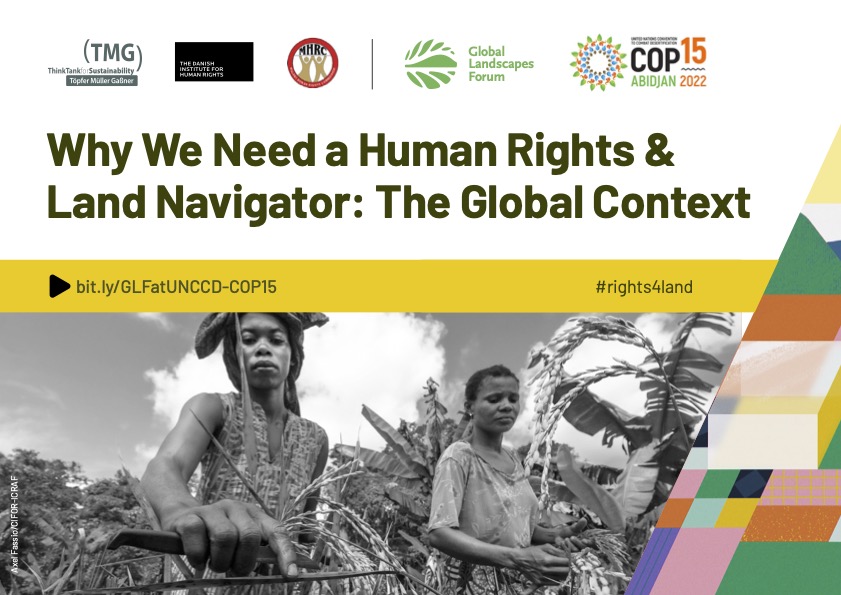
Topics and Regions
Landpages.co.ke is a medium of passing this message.
Details
Public Email
Location
Contributions
Displaying 551 - 560 of 740Tenure Rights for Restoration and Land Degradation Neutrality
TMG Research is working with the governments of Benin, Kenya, Madagascar, and Malawi to advance the implementation of the UNCCD Land Tenure Decision 26/
COP.14. The partnership involves analyses of the impact of activities to achieve Land Degradation Neutrality (LDN) on legitimate land tenure rights and to devise ways to secure legitimate tenure rights and achieve LDN. It benefits from support by the German Federal Ministry for Economic Development and Cooperation and GIZ.
GLF securing landscape rights as a catalyst to achieving land degradation neutrality
This is the video of a specific side event at the UNCCD COP 15 that discusses the importance of land tenure rights to achieving land degradation neutrality. This session took place in Abidjan, Côte d'Ivoire, on 12 May 2022.
Differentiated impacts of desertification, land degradation and drought on women and men
The study titled “Differentiated Impacts of Desertification, Land Degradation and Drought on Women and Men” released this week at COP15 has revealed that women are twice more affected by drought, land degradation, and deforestation. Drought and land degradation tend to increase the burden of unpaid care and domestic work shouldered by women and girls, which has also been further compounded by the coronavirus disease.
Land Acquisition and the Adoption of Soil and Water Conservation Techniques: A Duration Analysis for Kenya and The Philippines
This paper analyzes the adoption behavior of smallholder farmers using comparable plot-level duration data for Kenya and The Philippines. We find that adoption behavior is strongly linked to the process of land ownership transfer. This relationship is found both for data from Kenya and The Philippines and is robust to the inclusion of observed and unobserved village, household, plot, and time factors.
An assessment of the implications of alternative scales of communal land tenure formalization in pastoral systems
Pastoralism faces diverse challenges, that include, among others, land tenure insecurity, that has necessitated the need to formalize land rights. Some governments have started regularizing rights for privately owned land, but this is complex to implement in pastoral areas where resources are used and managed collectively. Our aim was to assess how the scale of communal land tenure recognition in pastoralist systems may affect tradeoffs among objectives such as tenure security, flexibility, mobility, and reduction of conflicts.
Land tenure, soil conservation, and farm performance: An eco-efficiency analysis of Austrian crop farms
We measure the eco-efficiency (EE) of agricultural production in regard to soil erosion and decompose it into technical efficiency (TE) and soil conservation efficiency (SCE). Data Envelopment Analysis is applied to a
The importance of different land tenure systems for farmers’ response to climate change: A systematic review
Climate change increasingly affects agricultural systems, making it necessary for farmers to adapt to changing climatic conditions. An important element shaping farmers’ adaptation decisions and their vulnerability is their respective land tenure system. Especially land tenure security can strongly influence farmers’ incentives for adapting to climate change.
Land tenure legislation and soil security concerns in Cameroon
This chapter explores the interface between land tenure rights and soil security and screens through the Cameroonian land tenure legislation in order to identify relevant provisions that guarantee soil security.
The Global Symposium on Soil Erosion (GSER19)
The Global Symposium on Soil Erosion (GSER19) represented a critical step towards the implementation of the Voluntary Guidelines for Sustainable Soil Management (VGSSM) in terms of minimizing the risk of soil erosion. GSER 19 identified effective and ineffective Sustainable Soil Management (SSM) practices, techniques, instruments and mechanisms which shed light on where the gaps and challenges are in terms of science, technology and legislation.




